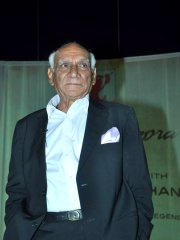


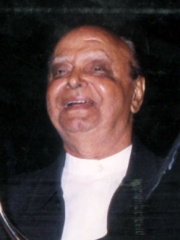
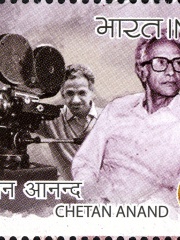
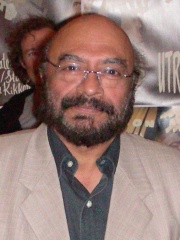
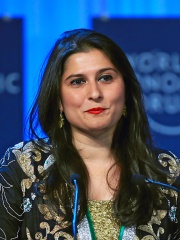
The Most Famous
FILM DIRECTORS from Pakistan
This page contains a list of the greatest Pakistani Film Directors. The pantheon dataset contains 2,041 Film Directors, 8 of which were born in Pakistan. This makes Pakistan the birth place of the 39th most number of Film Directors behind Ireland, and Egypt.
Top 8
The following people are considered by Pantheon to be the most legendary Pakistani Film Directors of all time. This list of famous Pakistani Film Directors is sorted by HPI (Historical Popularity Index), a metric that aggregates information on a biography's online popularity.

1. Yash Chopra (1932 - 2012)
With an HPI of 56.79, Yash Chopra is the most famous Pakistani Film Director. His biography has been translated into 41 different languages on wikipedia.
Yash Raj Chopra (27 September 1932 – 21 October 2012) was an Indian film director and film producer who worked in Hindi cinema. The founding chairman of the film production and distribution company Yash Raj Films, Chopra was the recipient of several awards, including 6 National Film Awards and 8 Filmfare Awards. He is considered among the best Hindi filmmakers, particularly known and admired for his romantic films with strong female leads. For his contributions to film, the Government of India honoured him with the Dadasaheb Phalke Award in 2001, and the Padma Bhushan in 2005. In 2006, the British Academy of Film and Television Arts presented him with a lifetime membership, making him the first Indian to receive the honour. Chopra began his career as an assistant director to I. S. Johar and his elder brother, B. R. Chopra. He made his directorial debut with Dhool Ka Phool in 1959, a melodrama about illegitimacy, and followed it with the social drama Dharmputra (1961). Chopra rose to prominence after directing the critically and commercially successful family drama Waqt (1965), which pioneered the concept of ensemble casts in Bollywood. In 1970, he founded his own production company, Yash Raj Films, whose first production was Daag: A Poem of Love (1973), a successful melodrama about polygamy. His success continued in the seventies, with some of Indian cinema's most successful and iconic films, including the action-thriller Deewaar (1975), which established Amitabh Bachchan as a leading actor in Bollywood; the ensemble musical romantic drama Kabhi Kabhie (1976) and the ensemble family drama Trishul (1978). Chopra collaborated with Sridevi in two of what has been considered to be his finest films; the romantic musical Chandni (1989), which became instrumental in ending the era of violent films in Bollywood and rejuvenating the romantic musical genre, and the intergenerational musical romantic drama Lamhe (1991), considered by critics and Chopra himself to be his best work, but underperformed at the domestic box-office, although bringing major profits overseas. After helming the critically-panned Parampara (1993), Chopra directed the musical psychological thriller Darr (1993), the first of his collaborations with Shahrukh Khan. Chopra directed three more romantic films, all starring Khan; Dil To Pagal Hai (1997), Veer-Zaara (2004) and Jab Tak Hai Jaan (2012), before announcing his retirement from direction in 2012. He died of dengue fever during Jab Tak Hai Jaan's production in 2012. He is considered one of the all-time best directors in Bollywood industry.

2. Gulzar (b. 1934)
With an HPI of 55.27, Gulzar is the 2nd most famous Pakistani Film Director. His biography has been translated into 38 different languages.
Gulzar (born Sampooran Singh Kalra; 18 August 1934) is an Indian Urdu poet, lyricist, author, screenwriter, and film director known for his works in Hindi cinema. He is regarded as one of greatest Urdu poets of this era. He started his career with music director S.D. Burman as a lyricist in the 1963 film Bandini and worked with many music directors including R. D. Burman, Salil Chowdhury, Vishal Bhardwaj and A. R. Rahman. Gulzar also writes poetry, dialogues and scripts. He directed films such as Aandhi and Mausam during the 1970s and the TV series Mirza Ghalib in the 1980s. He also directed Kirdaar in 1993. He has won 5 Indian National Film Awards; including 2 Best Lyrics, one Best Screenplay, one Second Best Feature Film (director), and one Best Popular Film (director); 22 Filmfare Awards; one Academy Award; and one Grammy Award. He was awarded the Sahitya Akademi Award - Hindi in 2002, the Padma Bhushan in 2004, the third-highest civilian award in India, and the Dadasaheb Phalke Award in 2013, the highest award in Indian cinema. In April 2013, Gulzar was appointed as the Chancellor of the Assam University. In 2024, Gulzar was awarded the Jnanpith, India's highest literary award.

3. Shekhar Kapur (b. 1945)
With an HPI of 54.10, Shekhar Kapur is the 3rd most famous Pakistani Film Director. His biography has been translated into 31 different languages.
Shekhar Kulbhushan Kapur (born 6 December 1945) is an Indian filmmaker. Born into the Anand-Sahni family, Kapur is the recipient of several accolades, including a BAFTA Award, a National Film Award, a National Board of Review Award and three Filmfare Awards, in addition to nomination for a Golden Globe Award. Kapur became known in Bollywood with his recurring role in the television series Khandaan. He then made his directorial debut with cult classic Masoom in 1983, before gaining widespread acclaim with Mr. India in 1987. He then gained international recognition and acclaim in 1994 with biographical film Bandit Queen, based on the infamous Indian bandit and politician Phoolan Devi. The film premiered in the directors' fortnight section of the 1994 Cannes Film Festival and was screened at the Edinburgh Film Festival. Kapur achieved further international prominence with the 1998 period film Elizabeth, a fictionalized account of the reign of British Queen Elizabeth I, which was nominated for seven Academy Awards. He then directed war drama film The Four Feathers (2002). In 2007, he directed Elizabeth: The Golden Age, the sequel to his 1998 film. Shekhar Kapur was awarded Padma Bhushan, India's third highest civilian award, in 2025.

4. Ramanand Sagar (1917 - 2005)
With an HPI of 49.09, Ramanand Sagar is the 4th most famous Pakistani Film Director. His biography has been translated into 18 different languages.
Ramanand Sagar (born Chandramauli Chopra; 29 December 1917 – 12 December 2005) was an Indian film-television director, producer, and writer. He is best known for his contribution to the television serials Ramayan (1987–1988), Luv Kush (1988–1989) and Shri Krishna (1993–1999), which broke several viewership records globally.
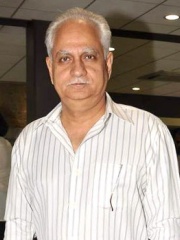
5. Ramesh Sippy (b. 1947)
With an HPI of 47.77, Ramesh Sippy is the 5th most famous Pakistani Film Director. His biography has been translated into 21 different languages.
Ramesh Sippy (born 23 January 1947) is an Indian film director, actor and producer in Hindi cinema. He is particularly known for being the director of Sholay (1975), regarded as one of the most influential films ever made in India. The Government of India honoured him with Padma Shri in 2013. In 2017, he has founded the Ramesh Sippy Academy of Cinema & Entertainment in Mumbai.

6. Chetan Anand (1915 - 1997)
With an HPI of 45.18, Chetan Anand is the 6th most famous Pakistani Film Director. His biography has been translated into 19 different languages.
Chetan Anand (3 January 1921 – 6 July 1997) was a Bollywood film producer, screenwriter and director from India, whose first film, Neecha Nagar, was awarded the Grand Prix Prize (now Golden Palm) at the first ever Cannes Film Festival in 1946. Later, he co-founded Navketan Films with his younger brother Dev Anand in 1949.

7. Govind Nihalani (b. 1940)
With an HPI of 42.35, Govind Nihalani is the 7th most famous Pakistani Film Director. His biography has been translated into 17 different languages.
Govind Nihalani (born 19 December 1940) is an Indian film director, cinematographer, screenwriter and producer, known for his works in Hindi cinema, particularly the movement of parallel cinema. He has been the recipient of six National Film Awards, and five Filmfare Awards.

8. Sharmeen Obaid-Chinoy (b. 1978)
With an HPI of 37.28, Sharmeen Obaid-Chinoy is the 8th most famous Pakistani Film Director. Her biography has been translated into 19 different languages.
Sharmeen Obaid-Chinoy (Urdu: شرمین عبید چنائے; born November 12, 1978) is a Pakistani journalist, filmmaker and political activist known for her work in films that highlight gender inequality against women. She is the recipient of seven Emmy Awards and two Academy Awards. She is slated to direct an upcoming Star Wars film featuring Daisy Ridley as Rey.
People
Pantheon has 8 people classified as Pakistani film directors born between 1915 and 1978. Of these 8, 5 (62.50%) of them are still alive today. The most famous living Pakistani film directors include Gulzar, Shekhar Kapur, and Ramesh Sippy. The most famous deceased Pakistani film directors include Yash Chopra, Ramanand Sagar, and Chetan Anand.
Living Pakistani Film Directors
Go to all RankingsGulzar
1934 - Present
HPI: 55.27
Shekhar Kapur
1945 - Present
HPI: 54.10
Ramesh Sippy
1947 - Present
HPI: 47.77
Govind Nihalani
1940 - Present
HPI: 42.35
Sharmeen Obaid-Chinoy
1978 - Present
HPI: 37.28
Deceased Pakistani Film Directors
Go to all RankingsYash Chopra
1932 - 2012
HPI: 56.79
Ramanand Sagar
1917 - 2005
HPI: 49.09
Chetan Anand
1915 - 1997
HPI: 45.18
Overlapping Lives
Which Film Directors were alive at the same time? This visualization shows the lifespans of the 3 most globally memorable Film Directors since 1700.

